Data-Driven Optimization of Ship Propulsion Efficiency and Emissions Considering Relative Wind
Abstract
1. Introduction
2. Materials and Methods
2.1. Training Ship
2.2. Data Acquisition and Sensor Configuration
2.3. Data Synchronization and Preprocessing
2.4. Data Analysis and Modeling
2.4.1. Variable Selection
2.4.2. Data Transformation
2.4.3. Correlation Analysis
2.4.4. Regression Modeling
2.4.5. Operational Optimization
2.4.6. Validation
3. Results
3.1. Distribution of Relative Wind Conditions and Navigational Characteristics
3.2. Changes in Propulsion Efficiency
3.3. Variations in Emission Characteristics
3.4. Regression Modeling
3.5. Optimization Results
4. Discussion
4.1. Physical Interpretation
4.2. Comparison with Previous Studies
4.3. Operational Implications
4.4. Limitations and Future Work
5. Conclusions
Author Contributions
Funding
Data Availability Statement
Acknowledgments
Conflicts of Interest
Appendix A
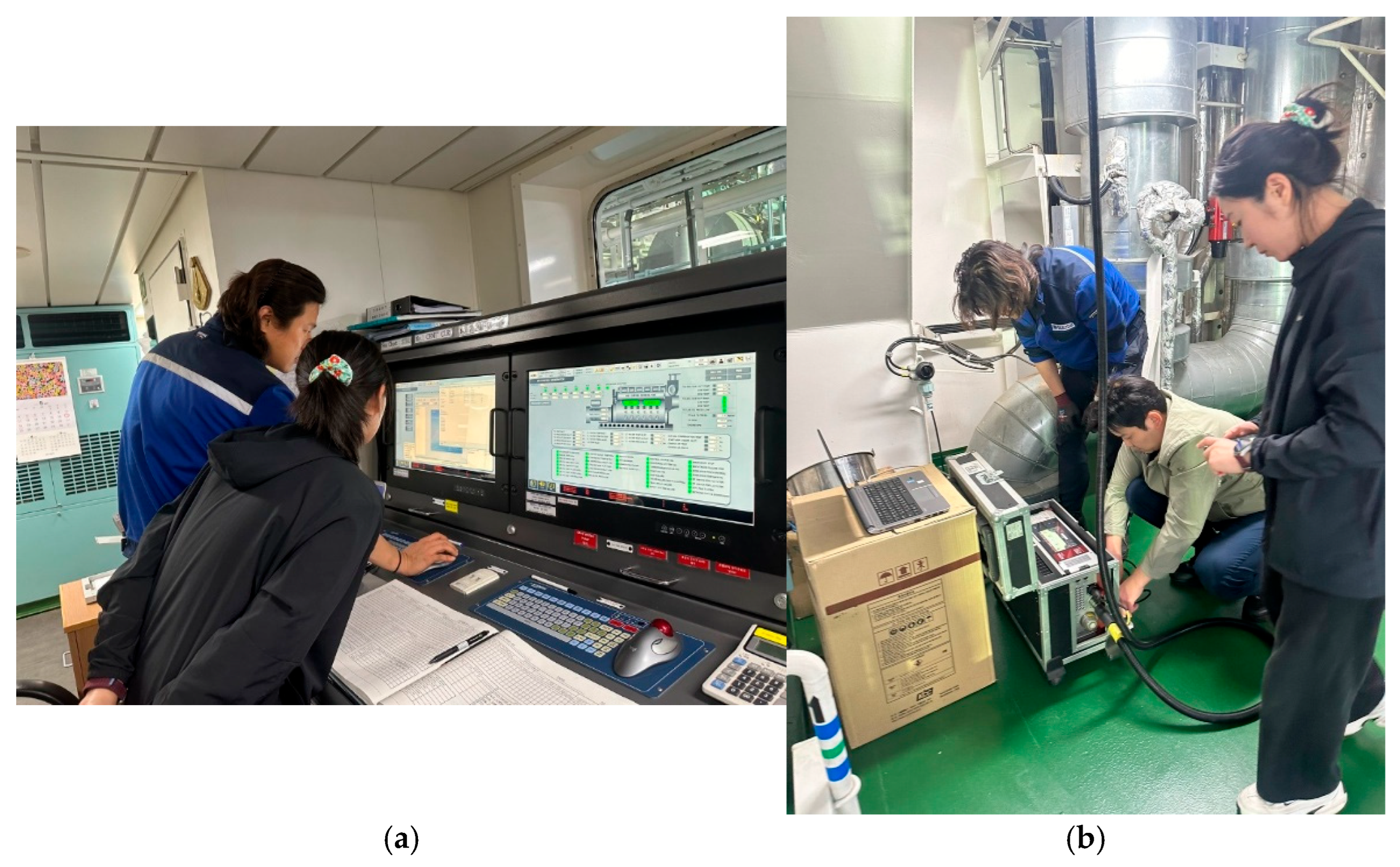

| Measuring Range | Response Time T90 | |
|---|---|---|
| O2 | 0–25 Vol% | <20 s |
| CO | 0–10,000 ppm | <40 s |
| NO | 0–1000 ppm | <30 s |
| NO2 | 0–200 ppm | <40 s |
| SO2 | 0–2000 ppm | <40 s |
| Cref | Concentration corrected to reference O2 content (ppm or mg/m3) |
| Cmeas | Measured concentration (ppm or mg/m3) |
| O2,ref | Reference O2 content (typically 13% for marine diesel engines) |
| O2,meas | Measured O2 content in exhaust gas (%) |
| 21 | O2 content in dry ambient air (%) |
References
- Olaniyi, E.O.; Solarte-Vasquez, M.C.; Inkinen, T. Smart Regulations in Maritime Governance: Efficacy, Gaps, and Stakeholder Perspectives. Mar. Pollut. Bull. 2024, 202, 116341. [Google Scholar] [CrossRef]
- International Maritime Organization (IMO). Resolution MEPC.328(76): 2021 Revised MARPOL Annex VI (EEXI/CII, etc.); IMO: London, UK, 2021. [Google Scholar]
- Comer, B.; Sathiamoorthy, B. How Updating IMO Regulations Can Promote Lower Greenhouse Gas Emissions from Ships; International Council on Clean Transportation: Washington, DC, USA, 2022. [Google Scholar]
- Hurren, T. NOx Measurement and Characterization in a Gaseous Fueled High-Pressure Direct-Injection Engine. Ph.D. Thesis, University of British Columbia, Vancouver, BC, Canada, 2022. [Google Scholar]
- Zhu, Y.; Li, Q.; Zhang, M.; Li, H. Application and Development of Selective Catalytic Reduction Technology for Marine Low-Speed Diesel Engines: Trade-Off among High-Sulfur Fuel, High Thermal Efficiency, and Low Pollution Emission. Atmosphere 2022, 13, 731. [Google Scholar] [CrossRef]
- Farkas, A.; Degiuli, N.; Martić, I.; Mikulić, A. Benefits of slow steaming in realistic sailing conditions along different sailing routes. Ocean Eng. 2023, 275, 114143. [Google Scholar] [CrossRef]
- Çetin, O.; Sogut, M.Z. A new strategic approach of energy management onboard ships supported by exergy and economic criteria: A case study of a cargo ship. Ocean Eng. 2021, 219, 108137. [Google Scholar] [CrossRef]
- Hüffmeier, J.; Johanson, M. State-of-the-art methods to improve energy efficiency of ships. J. Mar. Sci. Eng. 2021, 9, 447. [Google Scholar] [CrossRef]
- Wang, A.; Liu, Y.; Meng, B.; Lv, H. Tracing the CO2 emissions embodied in Chinese mainland’s exports with multinational enterprises: From source to sink. J. Clean. Prod. 2023, 414, 137430. [Google Scholar] [CrossRef]
- Grlj, C.G.; Degiuli, N.; Tuković, Ž.; Farkas, A.; Martić, I. The effect of loading conditions and ship speed on the wind and air resistance of a containership. Ocean Eng. 2023, 273, 113991. [Google Scholar] [CrossRef]
- Tran, N.K.; Lam, J.S.L. Effects of container ship speed on CO2 emission, cargo lead time and supply chain costs. Res. Transp. Bus. Manag. 2022, 43, 100723. [Google Scholar] [CrossRef]
- Chen, Z.S.; Lam, J.S.L.; Xiao, Z. Prediction of Harbour Vessel Emissions Based on Machine Learning Approach. Transp. Res. Part D Transp. Environ. 2024, 131, 104214. [Google Scholar] [CrossRef]
- ISO 15016:2015; Guidelines for the Assessment of Speed and Power Performance by Analysis of Speed Trial Data. International Organization for Standardization: Geneva, Switzerland, 2015.
- Park, H.; Lee, P.; Kim, J.; Kim, H.; Lee, H.; Lee, Y. Study on the Estimation Method of Wind Resistance Considering Self-Induced Wind by Ship Advance Speed. J. Mar. Sci. Eng. 2024, 12, 1694. [Google Scholar] [CrossRef]
- La Ferlita, A.; Qi, Y.; Di Nardo, E.; El Moctar, O.; Schellin, T.E.; Ciaramella, A. A Framework of a Data-Driven Model for Ship Performance. Ocean Eng. 2024, 309, 118486. [Google Scholar] [CrossRef]
- Lee, J.; Eom, J.; Park, J.; Jo, J.; Kim, S. The Development of a Machine Learning-Based Carbon Emission Prediction Method for a Multi-Fuel-Propelled Smart Ship by Using Onboard Measurement Data. Sustainability 2024, 16, 2381. [Google Scholar] [CrossRef]
- Ning, Y.; Liu, X.; Sun, P.; Zhang, X.; Gao, Y. Data-driven regional ship carbon emissions using AIS. Sustainability 2025, 17, 1159. [Google Scholar] [CrossRef]
- Berghout, T.; Mouss, L.H.; Bentrcia, T.; Elbouchikhi, E.; Benbouzid, M. A deep supervised learning approach for condition-based maintenance of naval propulsion systems. Ocean Eng. 2021, 221, 108525. [Google Scholar] [CrossRef]
- Nguyen, V.G.; Sakthivel, R.; Rudzik, K.; Kozak, J.; Sharma, P.; Pham, N.D.K.; Nguyen, X.P. Using Artificial Neural Networks for Predicting Ship Fuel Consumption. Pol. Marit. Res. 2023, 30, 3–13. [Google Scholar] [CrossRef]
- Byun, H.R.; Lee, D.K. Defining Three Rainy Seasons and the Hydrological Summer Monsoon in Korea Using Available Water Resources Index. J. Meteorol. Soc. Jpn. Ser. II 2002, 80, 33–44. [Google Scholar] [CrossRef]
- Isherwood, R.M. Wind resistance of merchant ships. Trans. R. Inst. Nav. Archit. 1973, 115, 327–338. [Google Scholar]
- Blendermann, W. Parameter identification of wind loads on ships. J. Wind. Eng. Ind. Aerodyn. 1994, 51, 339–351. [Google Scholar] [CrossRef]
- Emmens, T.; Amrit, C.; Abdi, A.; Ghosh, M. The Promises and Perils of Automatic Identification System Data. Expert Syst. Appl. 2021, 178, 114975. [Google Scholar] [CrossRef]
- Berens, P. CircStat: A MATLAB toolbox for circular statistics. J. Stat. Softw. 2009, 31, 1–21. [Google Scholar] [CrossRef]
- Hastie, T.J.; Tibshirani, R.J. Generalized Additive Models; Routledge: London, UK, 1990; pp. 136–173. [Google Scholar] [CrossRef]
- Wood, S.N. Generalized Additive Models: An Introduction with R, 2nd ed.; Chapman & Hall/CRC: Boca Raton, FL, USA, 2017. [Google Scholar] [CrossRef]
- Uyanik, T.; Arslanoglu, Y.; Kalenderli, O. Ship Fuel Consumption Prediction with Machine Learning. In Proceedings of the 4th International Mediterranean Science and Engineering Congress, Antalya, Turkey, 25–27 April 2019. [Google Scholar]
- Gkerekos, G.; Lazakis, I.; Theotokatos, G. Ship fuel consumption prediction using machine learning methods. Ocean Eng. 2019, 188, 106282. [Google Scholar] [CrossRef]
- Hu, Z.; Jin, Y.; Hu, Q.; Sen, S.; Zhou, T.; Osman, M.T. Prediction of fuel consumption for enroute ship based on machine learning. IEEE Access 2019, 7, 119497–119505. [Google Scholar] [CrossRef]
- Deb, K. Multi-Objective Optimisation Using Evolutionary Algorithms: An Introduction. In Multi-Objective Evolutionary Optimisation for Product Design and Manufacturing; Wang, L., Ng, A.H.C., Deb, K., Eds.; Springer: London, UK, 2011; pp. 3–34. [Google Scholar]
- La Ferlita, A.; Qi, Y.; Di Nardo, E.; El Moctar, O.; Schellin, T.E.; Ciaramella, A. A comparative study to estimate fuel consumption: A simplified physical approach against a data-driven model. J. Mar. Sci. Eng. 2023, 11, 850. [Google Scholar] [CrossRef]
- Leifsson, L.Þ.; Sævarsdóttir, H.; Sigurðsson, S.Þ.; Vésteinsson, A. Grey-box modeling of an ocean vessel for operational optimization. Simul. Model. Pract. Theory 2008, 16, 923–932. [Google Scholar] [CrossRef]
- Tillig, F.; Ringsberg, J.W. A 4 DOF simulation model developed for fuel consumption prediction of ships at sea. Ships Offshore Struc. 2019, 14 (Suppl. S1), 112–120. [Google Scholar] [CrossRef]
- Guo, B.; Liang, Q.; Tvete, H.A.; Brinks, H.; Vanem, E. Combined machine learning and physics-based models for estimating fuel consumption of cargo ships. Ocean Eng. 2022, 255, 111435. [Google Scholar] [CrossRef]
- Wang, S.; Ji, B.; Zhao, J.; Liu, W.; Xu, T. Predicting ship fuel consumption based on LASSO regression. Transp. Res. D Trans. Environ. 2018, 65, 817–824. [Google Scholar] [CrossRef]
- Szlapczynska, J.; Szlapczynski, R. Preference-based evolutionary multi-objective optimization in ship weather routing. Appl. Soft Comput. 2019, 84, 105742. [Google Scholar] [CrossRef]
- Yang, L.; Chen, G.; Rytter, N.G.M.; Zhao, J.; Yang, D. A genetic algorithm-based grey-box model for ship fuel consumption prediction towards sustainable shipping. Ann. Oper. Res. 2025, 349, 525–551. [Google Scholar] [CrossRef]
- Lashgari, M.; Akbari, A.A.; Nasersarraf, S. A new model for simultaneously optimizing ship route, sailing speed, and fuel consumption in a shipping problem under different price scenarios. Appl. Ocean Res. 2021, 113, 102725. [Google Scholar] [CrossRef]
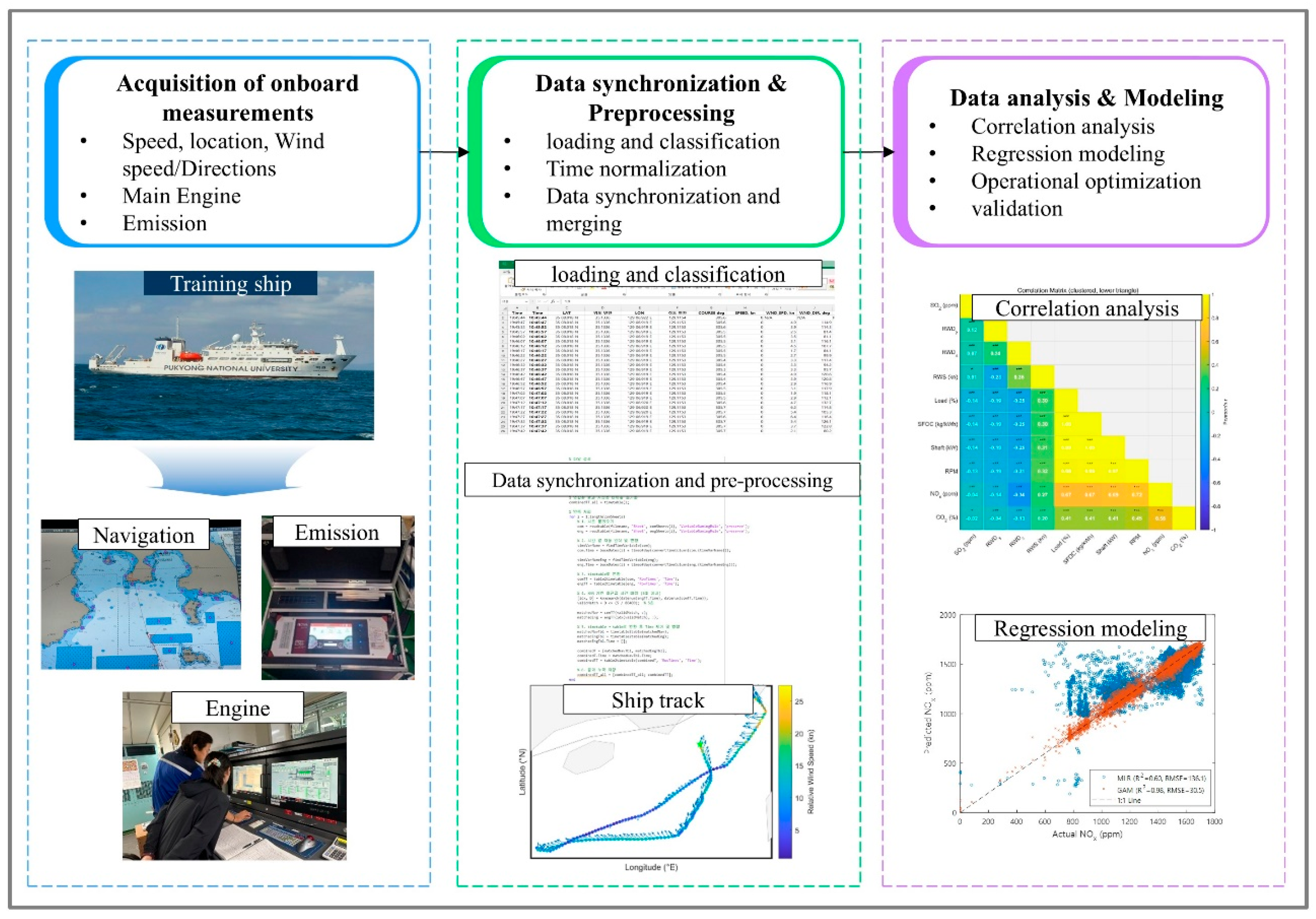
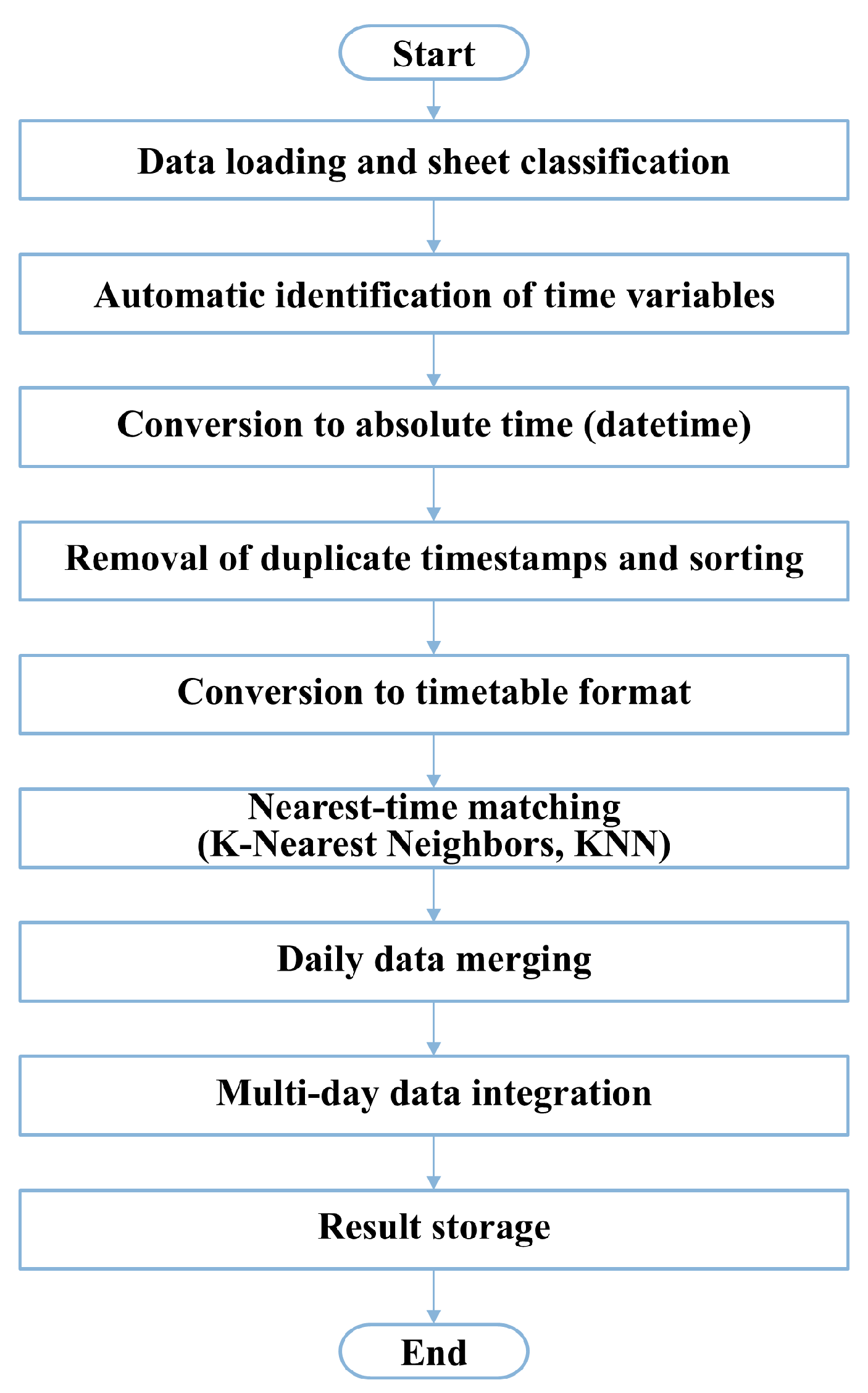
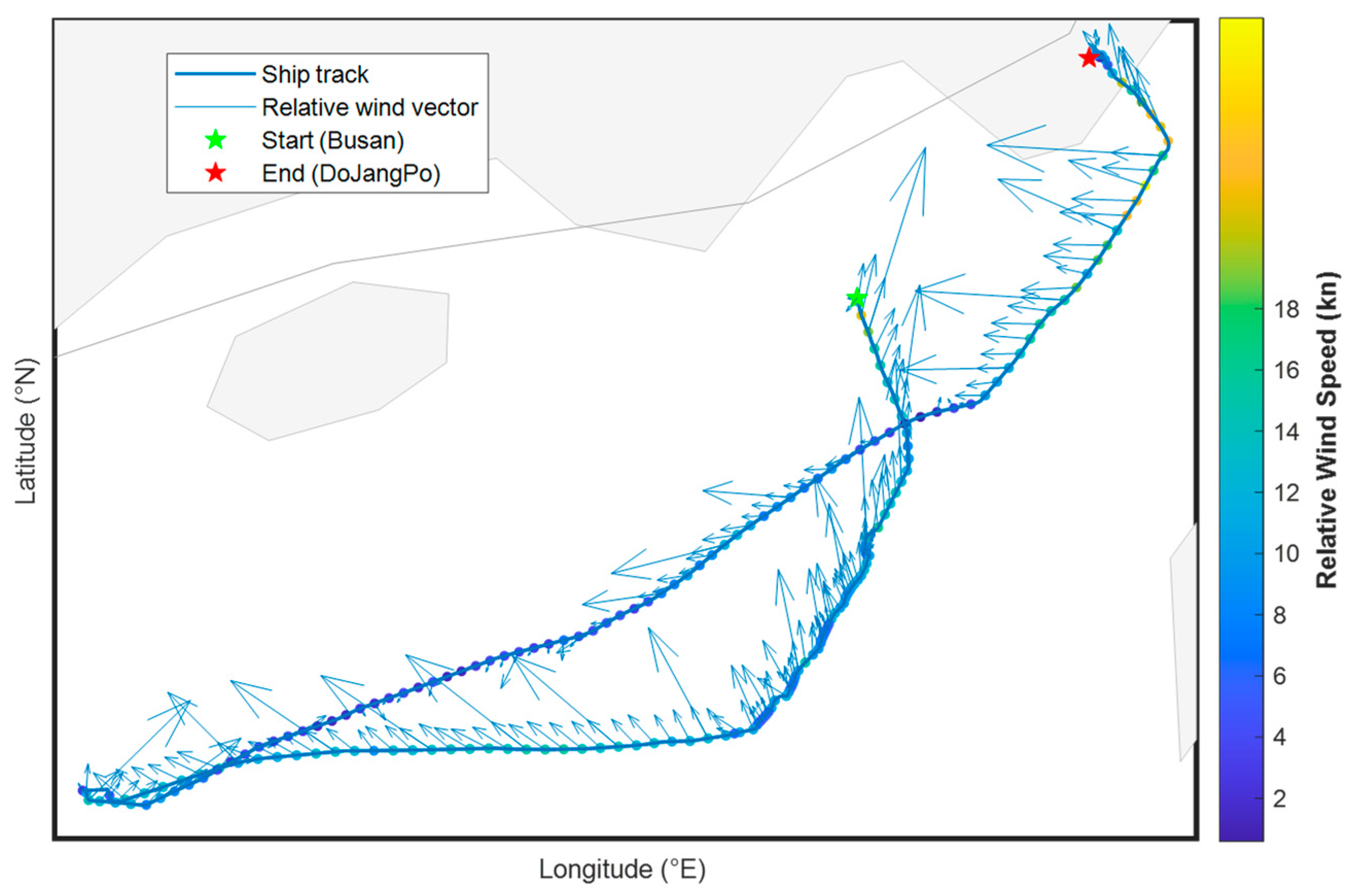
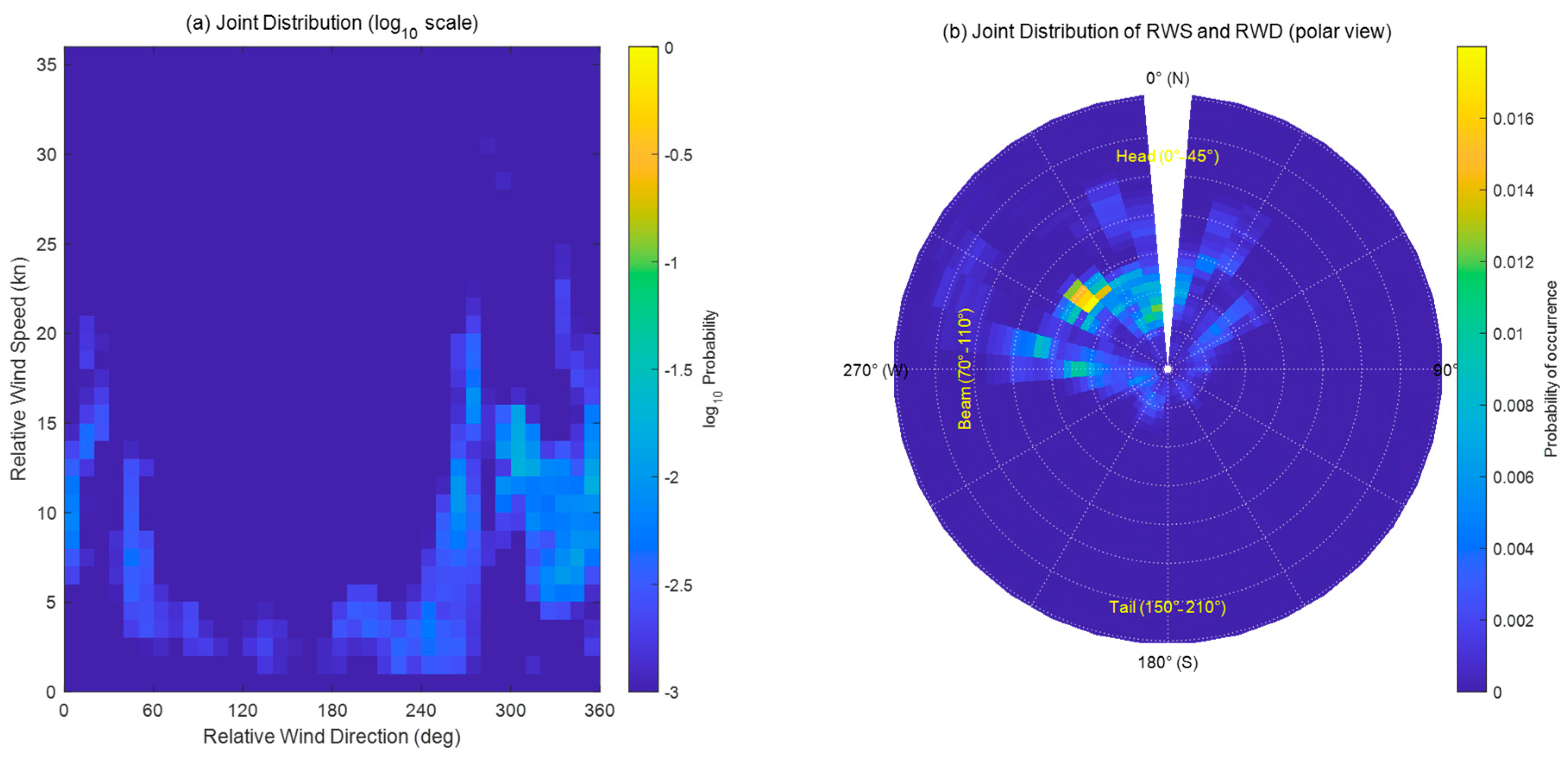
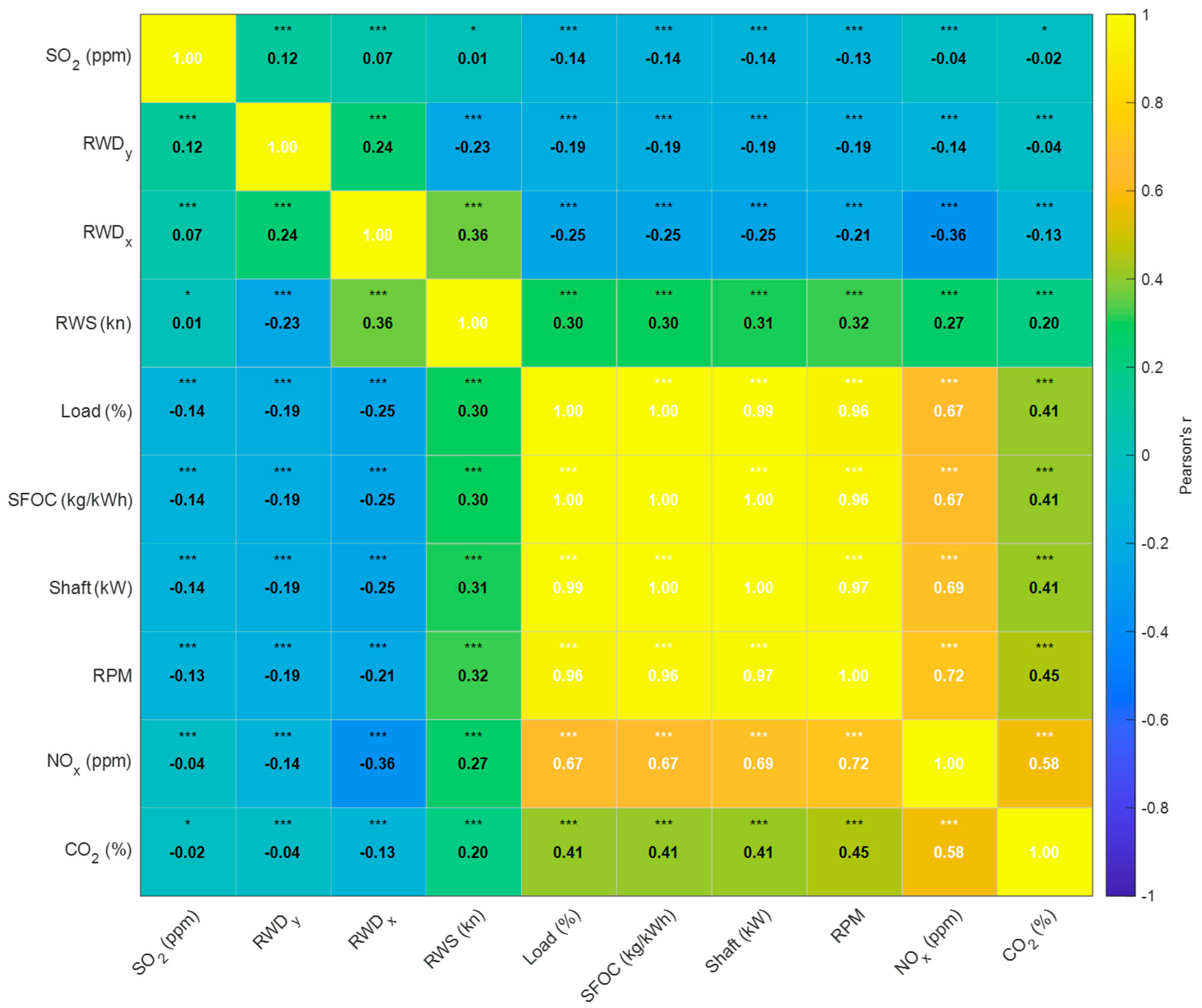
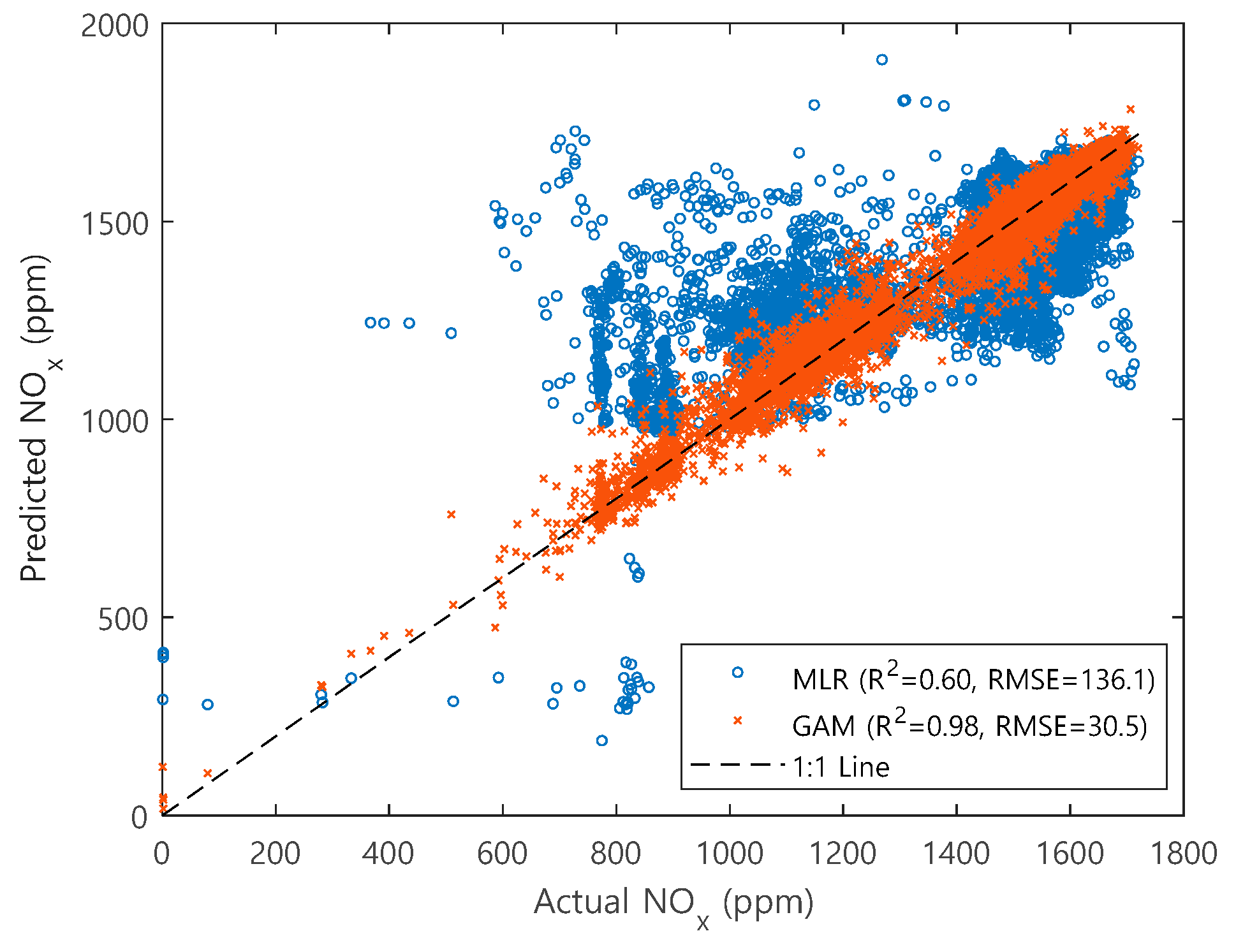
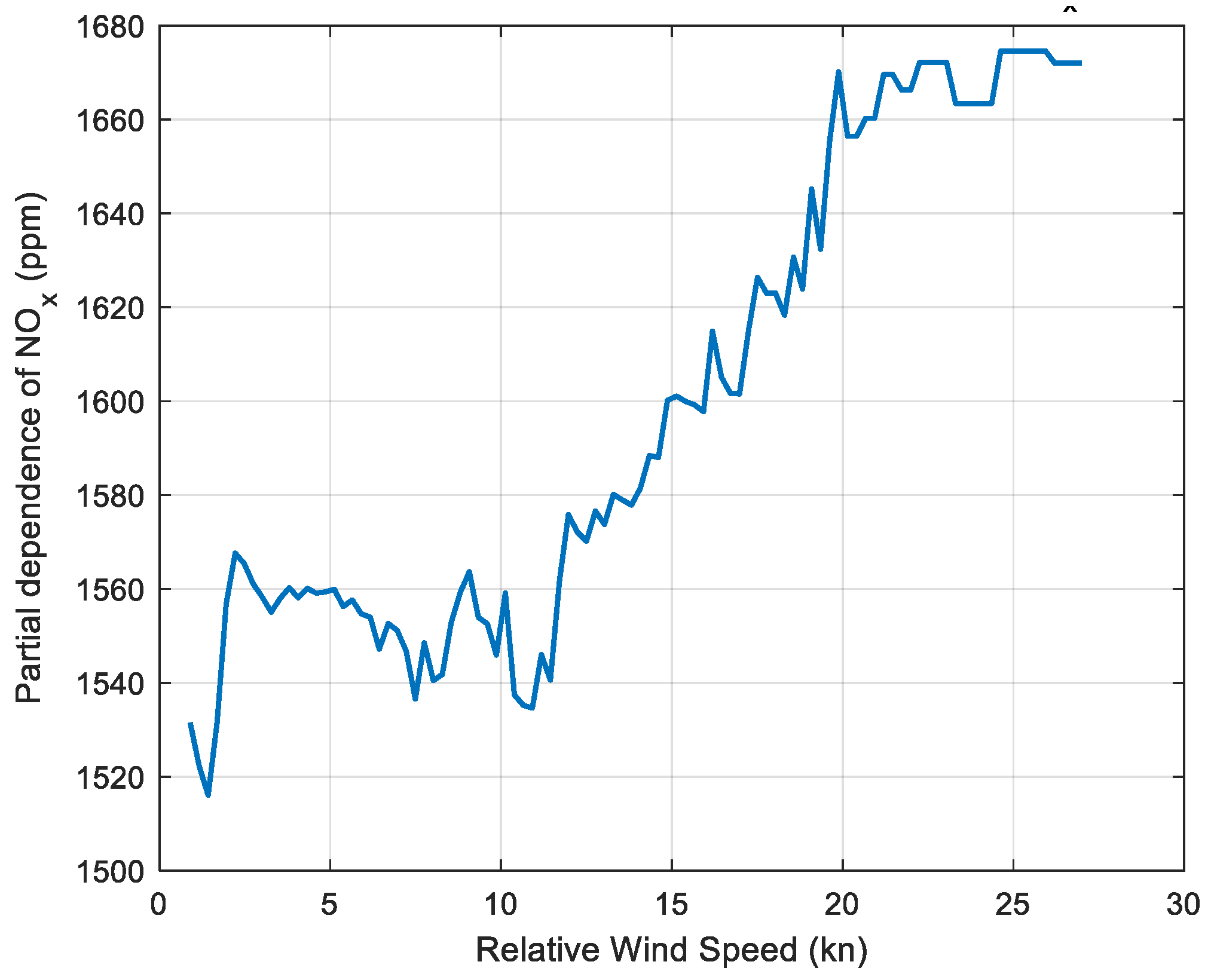

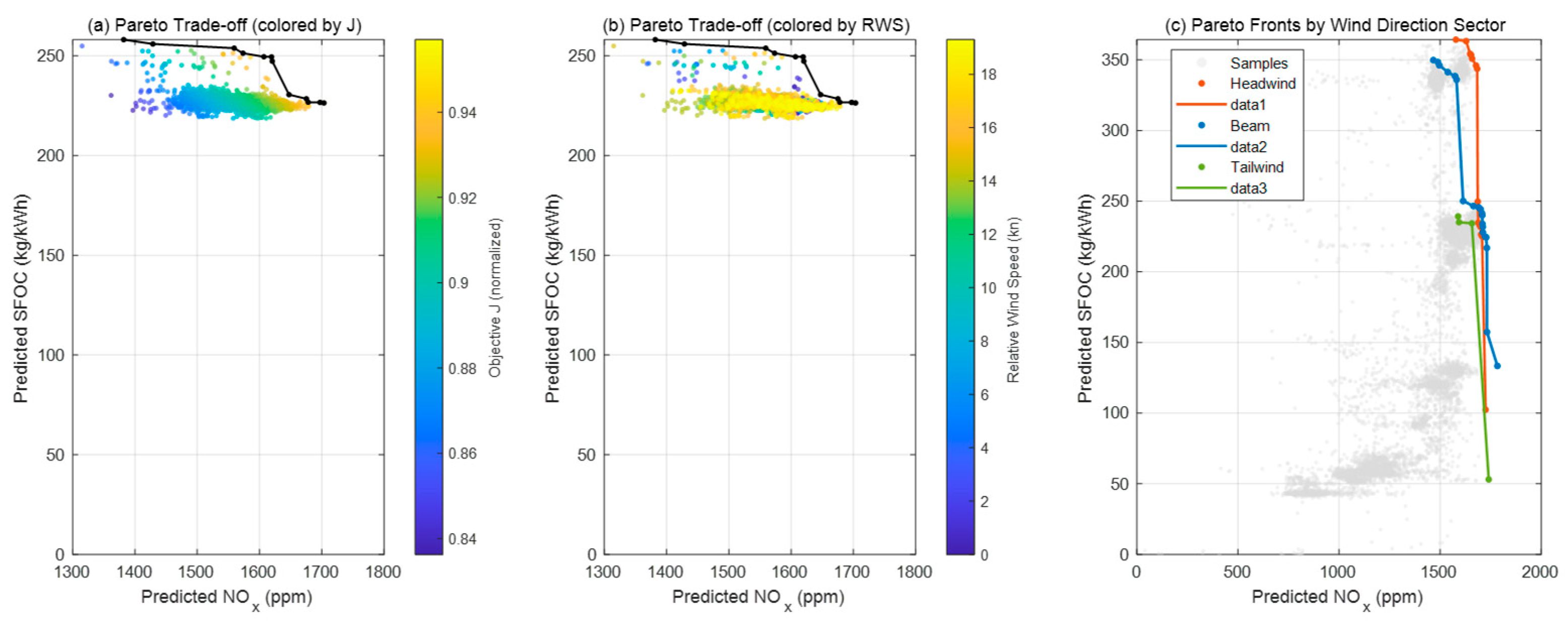

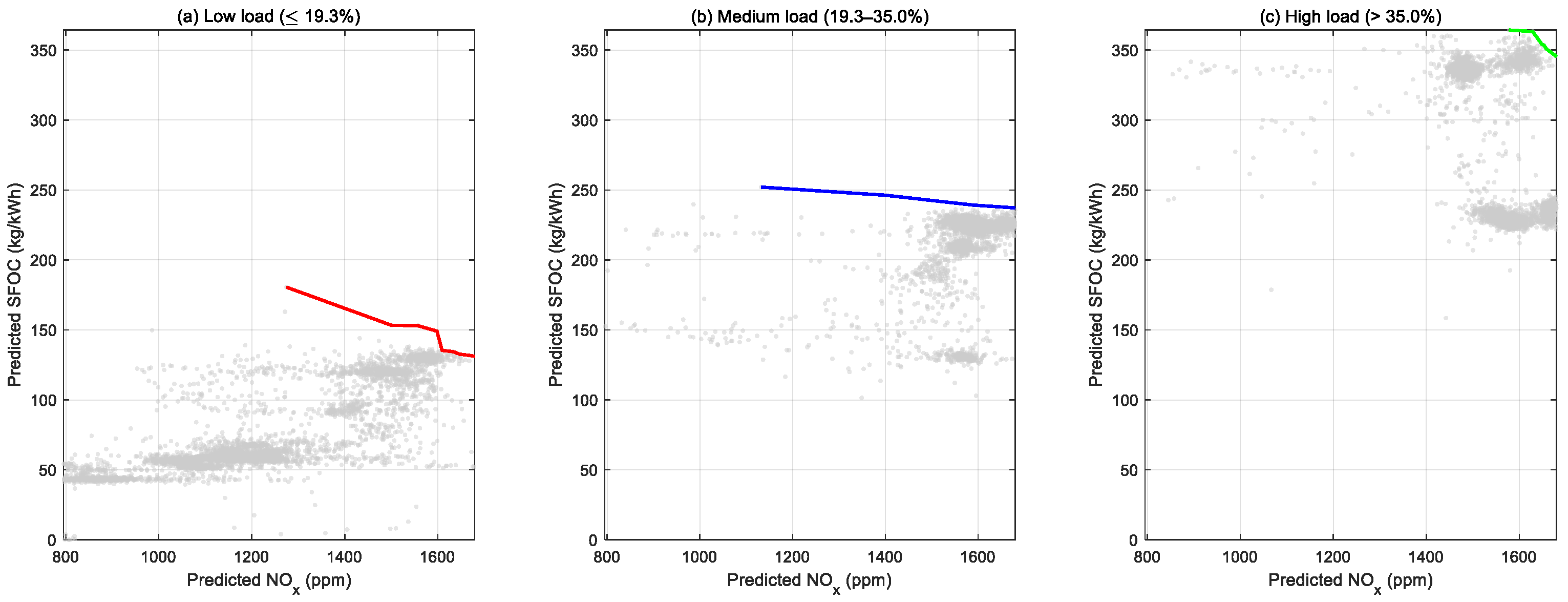
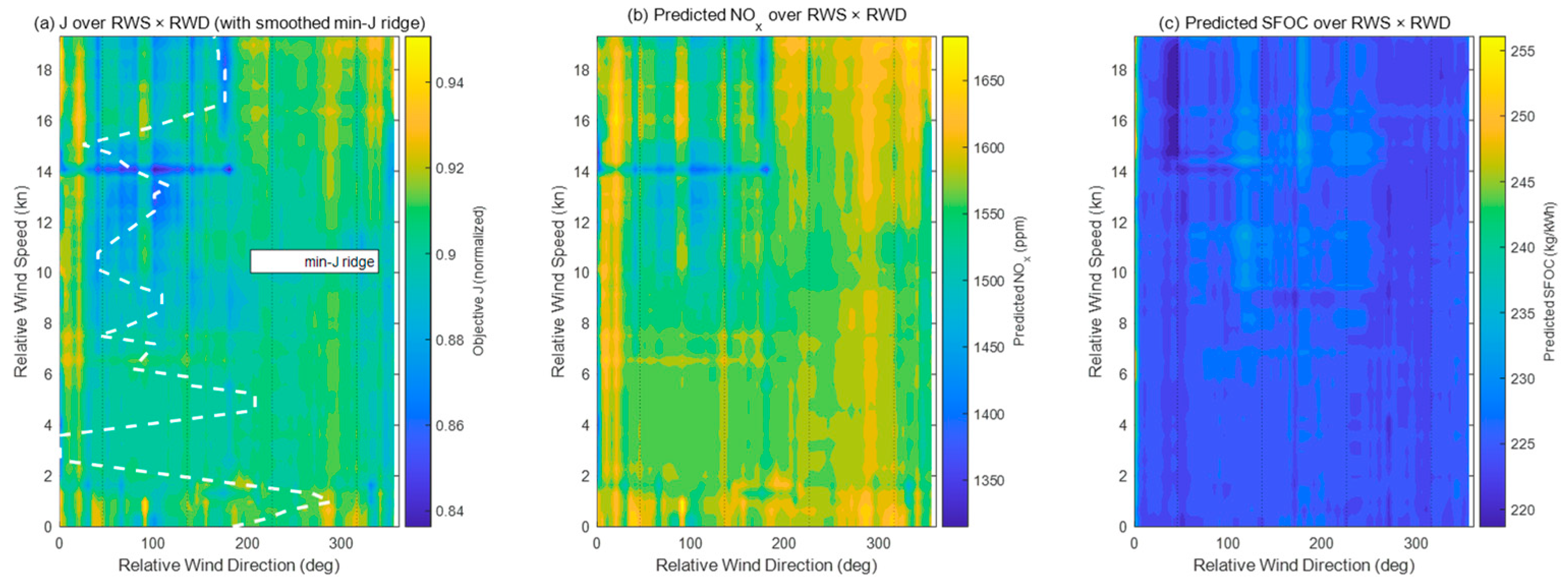
| Parameter | Value |
|---|---|
| Length Overall (LOA) | 97.0 m |
| Length Between Perpendiculars (LBP) | 85.0 m |
| Breadth | 15.4 m |
| Gross tonnage | 3997 t |
| Maximum speed | 16.0 kn |
| Service speed | 15.2 kn |
| Main engine type | Two-stroke low-speed diesel |
| Main engine output | 4727 PS × 167 rpm |
| Propeller | Four-blade CPP |
Disclaimer/Publisher’s Note: The statements, opinions and data contained in all publications are solely those of the individual author(s) and contributor(s) and not of MDPI and/or the editor(s). MDPI and/or the editor(s) disclaim responsibility for any injury to people or property resulting from any ideas, methods, instructions or products referred to in the content. |
© 2025 by the authors. Licensee MDPI, Basel, Switzerland. This article is an open access article distributed under the terms and conditions of the Creative Commons Attribution (CC BY) license (https://creativecommons.org/licenses/by/4.0/).
Share and Cite
Park, S.-A.; Je, M.-A.; Jung, S.-H.; Park, D.-J. Data-Driven Optimization of Ship Propulsion Efficiency and Emissions Considering Relative Wind. J. Mar. Sci. Eng. 2025, 13, 2120. https://doi.org/10.3390/jmse13112120
Park S-A, Je M-A, Jung S-H, Park D-J. Data-Driven Optimization of Ship Propulsion Efficiency and Emissions Considering Relative Wind. Journal of Marine Science and Engineering. 2025; 13(11):2120. https://doi.org/10.3390/jmse13112120
Chicago/Turabian StylePark, Sang-A, Min-A Je, Suk-Ho Jung, and Deuk-Jin Park. 2025. "Data-Driven Optimization of Ship Propulsion Efficiency and Emissions Considering Relative Wind" Journal of Marine Science and Engineering 13, no. 11: 2120. https://doi.org/10.3390/jmse13112120
APA StylePark, S.-A., Je, M.-A., Jung, S.-H., & Park, D.-J. (2025). Data-Driven Optimization of Ship Propulsion Efficiency and Emissions Considering Relative Wind. Journal of Marine Science and Engineering, 13(11), 2120. https://doi.org/10.3390/jmse13112120






